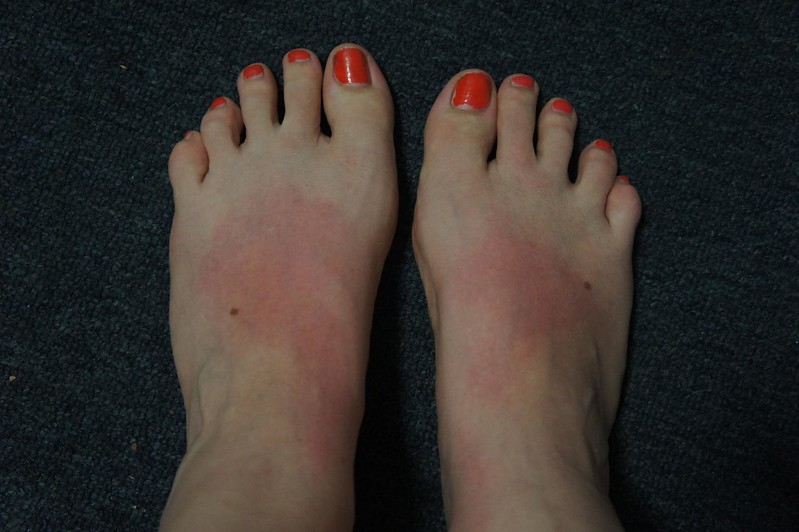How to Treat Sunburnt Feet
Summer has arrived, which means many of us will be heading to the lake or pool or out to the ocean for vacation. Applying sunscreen is important when exposed to direct sunlight, especially when in the water since the sunlight reflects off its surface. Many people forget to protect one important part of their bodies, their feet. This area tends to get painful quickly when sunburnt and, depending on the severity, can cause unwanted long-term effects. In addition to wearing proper sun protection, the following can help keep you and your feet comfortable and safe this summer season.
Why are My Sunburnt Feet Itchy?

A sunburn happens as a response to ultraviolet damage to the skin’s surface. The melanin in your skin helps defend against some of the sun’s rays, but your exposed skin can become damaged quickly without proper coverage. The amount of melanin in your skin varies depending on genetics. A sunburn occurs after prolonged exposure to UV rays and causes cells to become red, swollen, and painful. A severe sunburn can even blister. After your skin starts to heal, you may notice your skin beginning to peel. This is your body’s way of trying to rid itself of the damaged cells.
Situations That Increase Your Risk
During the summer months, it’s easy to expose yourself to the sun’s rays. Your feet may be the last area you worry about when out enjoying the day. You may be exposing your feet to the sun any time you’re outside without full shoe coverage, including being barefoot or wearing sandals around the pool, lake, or ocean.
How To Treat a Sunburn
Sunburns are painful, and the faster you’re able to treat them, the better. Follow these tips to help treat your sunburnt feet at home and get to feeling better as soon as possible:
- Dip your feet in cool water to help cool the burn. Avoid harsh soaps while doing so, and avoid soaking for a prolonged period as this may irritate your skin further.
- Moisturize! Before your skin has dried completely, apply a gentle lotion such as an after-sun or aloe lotion to help keep the skin moisturized.
- Avoid oil-based lotions as this may make your sunburn feel worse and trap the heat.
- Take an anti-inflammatory drug for swelling and pain. This includes nonsteroidal drugs such as naproxen, ibuprofen, or aspirin when appropriate.
- Drink plenty of fluids. Sunburns can cause dehydration. By replenishing your body, you’re encouraging your body to heal more quickly.
- Avoid the sun until your sunburn is healed.
- Try to stay out of shoes and socks until your burn is healed. These may irritate your feet even more.
For severe sunburn, you may need to seek medical attention to help lessen the long-term effects and make you more comfortable.
Signs That Your Sunburn Needs Medical Attention
Sometimes sunburns aren’t able to be treated appropriately at home. Some of the signs that you should seek medical attention are:
- You develop a fever higher than 102 degrees Fahrenheit.
- You have prolonged periods of the chills.
- You experience severe confusion, fatigue, or dizziness.
- You have severe blistering.
- You notice signs of skin infection, including oozing, severe swelling, and extreme pain.
- Your feet are covered in sunburn and it’s painful to walk as usual.
It’s important to seek the proper care to help prevent permanent damage and scarring. A medical professional can assess the damage and develop a treatment plan to get your feet feeling better faster.
How To Prevent a Foot Sunburn
There is no reason why you can’t head outdoors and feel the warmth of the sun, but proper protection for your skin is essential. If you’re outside enjoying the warmer weather and want to prevent sunburn, follow these tips:
- Wear protective clothing. This may be a long-sleeved shirt for your arms, UV-blocking sunglasses for your eyes, and a broad-brimmed hat for your face.
- Apply the proper sunscreen liberally to exposed areas, especially your feet. A proper sunscreen should protect you against both UVA and UVB rays.
- Reapply sunscreen at least every two hours, more if you’re swimming or sweating a lot. SPF 30 or above is recommended.
- Apply your sunscreen before you head outside.
- Avoid the sun between 10 a.m. and 4 p.m. if possible, as this is when the sun’s rays are the strongest.
- You may even apply sunscreen when you’re wearing sandals to help keep your feet safe.
If you follow the tips above, you will be able to decrease your risk of a serious sunburn significantly.
Why Applying Sunscreen Is Important
Every time you get a sunburn, no matter how slight, you are damaging your skin. This can result in premature aging and even heighten your risk of skin cancers such as melanoma, basal cell carcinoma, and squamous cell carcinoma. Sometimes you can experience flu-like symptoms such as nausea, headache, fatigue, and chills from a severe sunburn.
It’s easy to reduce your risk of sunburn if you follow the steps above. If you’re experiencing a severe burn, you may need medical attention to help make you more comfortable. Dr. Schoene at Gurnee Podiatry & Sports Medicine Associates can help.
Running With Sunburnt Feet
If you’re used to living an active lifestyle or are just used to wearing closed shoes, then a sunburn can cause inconvenience and pain. Depending on the severity of pain, swelling, and blistering, you may need to cease physical activity, such as dancing or running, until your skin is healed. These are only the short-term effects. Long-term effects include the possibility of skin cancer.
How Can Dr. Schoene Help?
If you’ve experienced a severe sunburn on your feet, then medical treatment may be necessary. Dr. Schoene is a board-certified podiatrist and is trained to handle situations such as this. She can put together a plan to help minimize pain and any long-term effects from your sunburn. Reach out today to make an appointment at our Chicago office. Have fun this summer, and don’t forget your sunscreen.
